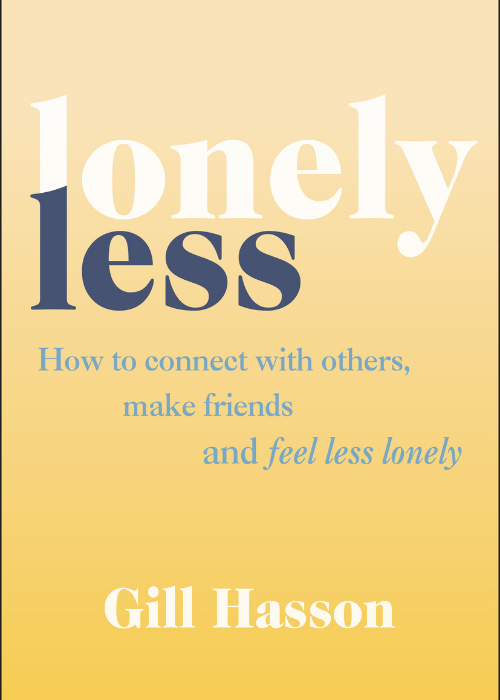By Gill Hasson, author of Lonely Less: How to Connect with Others, Make Friends and Feel Less Lonely
Even though you might meet with other people, take part in social activities and events, and have people in your life that you consider as friends, you might feel like you don’t really fit in; you’re like a round peg in a square hole.
Perhaps, in a range of situations or with some people, you feel like you’re an outsider. It could be that you feel different from others in some way, or a number of ways.
You may think that people don’t really ‘get’ you or who you really are.
Spending time with people you don’t feel close to can leave you feeling lonely.
No doubt you’ve heard the cliché about feeling lonely in a crowd. It might be a cliché but so often – like all clichés – it’s true. Another cliché is that hell can be other people. And in a slight twist, loneliness, as well as hell, can be other people.
Are You Trying Too Hard?
It’s natural to want others to understand us – our feelings and experience. But fitting in and feeling that you belong doesn’t only come from being accepted by others.
It starts with accepting and being yourself. Your true self.
Too often we can try to be someone we’re not – you might, for example, try too hard to be funny or show that you know a lot, that you’re clever – in order to be liked, accepted, and fit in.
Of course, to a certain extent in different contexts and with different people – older family members, for example, children, colleagues, people in authority, or someone who is vulnerable – we adjust our behaviour accordingly in order to fit in or accommodate the other person. On the other hand, it’s easy to be overly concerned with what others think of you, with the result that you try to be someone you’re not.
You may think that to be accepted and liked you have to be someone you’re not. But doing that will leave you with unsatisfactory relationships and a sense that no one really accepts or understands you.
Rather than act like you’re someone else, you need to do quite the opposite. You need to act yourself. As Dr Seuss said: ‘Today you are you, that is truer than true. There is no one alive who is you’er than you.’
But how do you know who and what your true self is? By identifying what your values are.
No doubt you’ll have heard the exhortation to ‘be true to yourself!’ and you may have wondered what exactly that means; how do you be true to yourself? By living your life according to your values. Then you are being true to yourself.
Maybe you’ve not given much thought to what your values are, but that doesn’t mean you don’t have them. Quite simply, your values are what’s important to you and has some worth to you in the way that you live, work, and relate to other people.
What have your values got to do with fitting in and feeling that you belong? When you’re with people who either have similar values to you, or respect that your values are different to theirs, then in your interactions with them, you’re able to be your true self; you can be real, genuine, and authentic. You feel that there is a mutual respect and understanding. You feel that you fit in.
On the other hand, when you are with people whose values are different from yours and there is little or no respect for each other’s different values, it’s a struggle to fit in and feel comfortable with that person or people because what matters to you isn’t so important to them.
And vice versa.
An example of different values could be where two people have different political or religious beliefs. Another example concerns work values – what’s important to you about what you put into and get out of your job, your work or career may be very different to someone else’s work values. And in another example, family values can differ; what you feel is important about how family members interact – values concerning duty and loyalty, truth and honesty, caring and compassion, etc. – may be different from another person’s family values.
So, if there are certain people you feel less comfortable with than others, knowing that having similar values to someone else is what helps you to like each other and get on can help you understand why some people just aren’t your type; why you don’t feel that you fit in with them. There’s nothing wrong with either of you – you just have different values, beliefs, and expectations from each other.
There’s always going to be someone and some groups of people you won’t fit in with. But that’s not a problem if you’re able to be who you truly are. Then, fitting in might not be so important. Why? Because the more you are able to accept yourself, to be who you are and do the things you like – things you want to do, that interest you and matter to you – the more likely others like you, who feel the same way and have the same interests and values, will be drawn to you. There are other square pegs out there!
This is an edited extract from Lonely Less: How to Connect with Others, Make Friends and Feel Less Lonely by Gill Hasson (published by Capstone, June 2021)
Anyone, whatever their age, gender, culture or abilities, can find themselves disconnected from others and feeling lonely. The Campaign to End Loneliness states that there are currently nine million lonely people in the UK.
In her latest book, Lonely Less: How to Connect with Others, Make Friends and Feel Less Lonely best-selling author Gill Hasson covers areas including how to:
Meet new people and make friends
Fit in and be in tune with others
Manage time alone
Keep connected when working from home
Manage existential loneliness; the disconnection that can follow a traumatic experience
She also discusses how to support others who may be struggling with feelings of loneliness
As social beings, we each need to interact with others; to connect in positive ways and feel that we are understood, that we belong and are valued by others. Due to be published during Loneliness Awareness Week 2021 (14-18th June 2021), Lonely Less offers practical strategies anyone can implement to counter loneliness, connect with and enjoy the company of other people, make friends, be understood and feel a sense of belonging.
Find out more:


Gill Hasson is the author of Lonely Less: How to Connect with Others, Make Friends and Feel Less Lonely (published by Capstone, June 2021). She has 20 years’ experience teaching and writing on a range of issues to do with personal and professional development, mental health and wellbeing. She is the author of more than 22 books; the bestselling Mindfulness, Mindfulness Pocketbook, Emotional Intelligence, Positive Thinking, the Sunday Times bestseller How To Deal With Difficult People, plus other books on the subjects of resilience, communication skills, assertiveness, and Careers.
https://www.gillhasson.co.uk/
Follow: @gillhasson


